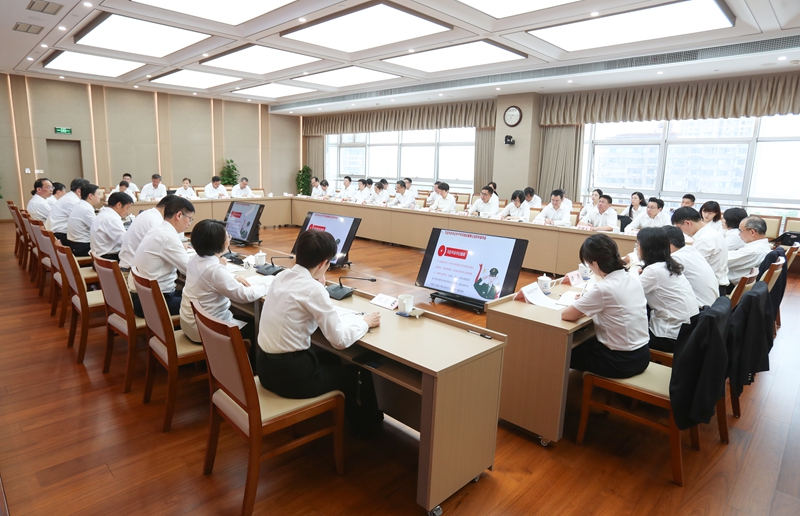
 Your current location >> Picture News
Your current location >> Picture News


On May 23, the Shanghai High People’s Court (SHPC) held an expanded study session of the Party Leadership Group’s Theoretical Study Center with the theme of "Persevering in Implementing the Central Eight-Point Decision.” The session featured a special tutorial lecture delivered by Professor Wu Tao, the Director of the Grassroots Party Building Research Center at the China Executive Leadership Academy Pudong. Jia Yu, Secretary of the Party Leadership Group and President of the SHPC, chaired the session and delivered a speech.
Professor Wu Tao provided a systematic review and in-depth interpretation of the rich connotations and profound significance of General Secretary Xi Jinping’s important discourses on work style construction, and the Spirit of the Central Eight-Point Decision. Following the lecture, members of the Party Leadership Group of the SHPC actively participated in in-depth discussions, sharing their learning insights and reflections inspired by the session’s content.
The meeting emphasized the importance of strengthening Party spirit cultivation and consolidating the bulwark of the Central Eight-Point Decision through robust Party spirit. Recognizing from a political standpoint that work style development is foundational to the Party’s ruling legitimacy and the success or failure of our mission, we must deeply acknowledge the tasks and challenges ahead. With the clear-eyed understanding that work style improvement is a perpetual endeavor, we must thoroughly understand General Secretary Xi Jinping’s important expositions on strengthening the Party's work style construction and the Spirit of the Central Eight-Point Decision. We must fortify the conviction in our minds and earnestly fulfill the political, legal, and judicial responsibilities entrusted to us by the Party and the people.
The meeting emphasized the need to adhere to the principle of “leading by example,” leveraging the exemplary role of the “critical few” to drive concentrated rectification efforts to yield tangible results. Leading cadres at all levels in the courts should strengthen their political responsibility, strictly align themselves with the requirements of the Central and the Municipal Committee, and strive for practical outcomes in addressing prominent issues. For the rectification measures with specific plans formulated, efforts should be made to expedite the progress and achieve results as soon as possible. For issues that require multi-departmental collaboration to resolve, the leading officials in charge and the responsible departments should enhance communication and coordination, effectively pooling their rectification efforts. This will motivate all cadres and police officers to cultivate a sound judicial work style and achieve high-quality judicial performance.
The meeting mandated that the transformation of good work styles into customary practices shall be promoted to lead the high-quality development of the work of Shanghai courts with excellent work styles. In line with the latest directives from the Central and Municipal Committee on study and education initiatives, we must prioritize the inspection and rectification of the “Four Forms of Decadence” at the grassroots level. This requires a dual focus on addressing both symptomatic and root causes, targeting the underlying issues of misaligned performance mindsets and a lack of accountability that drive such behaviors. We shall work proactively to minimize opportunities for hidden or evolving problems by strengthening educational efforts and institutional safeguards. Additionally, tangible improvements in work ethos must be firmly embedded in every phase and facet of court operations. This will ensure that by mid-year, we reach the milestone of “halfway through the timeline, halfway through the tasks,” thereby establishing a robust foundation for accomplishing our annual goals.
Attendees at the meeting included members of the Party Leadership Group of the Shanghai High People’s Court, Court leaders, bureau-level officials, department heads, and middle-level leaders from various departments within the SHPC, as well as representatives from specific roles, newly appointed officials, and young cadres and police officers.
>> Chinese Version
